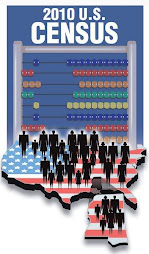The AP has an informative piece regarding Obama's pick to head the Census Bureau, which oversees the upcoming decennial headcount of America. Obama's choice - Robert Groves - is a professor who advocates the controversial "sampling" method of counting individuals, as opposed to actual enumeration. Read the story below or click here for more information.
Obama to nominate sampling expert to head census
By HOPE YEN –
WASHINGTON (AP) — President Barack Obama has chosen Robert M. Groves to be the next census director, turning to a professor who has clashed with Republicans over the use of statistical sampling to lead the high-stakes head count.
The White House will announce the selection of Groves on Thursday, a Commerce Department official told The Associated Press. The official demanded anonymity because the individual was not authorized to speak before the announcement.
Groves is a former Census Bureau associate director of statistical design, who served from 1990-92. He has spent decades researching ways to improve survey response rates. If confirmed by the Senate, he will take the helm less than a year before the decennial count, which has been beset by partisan bickering and will be used to apportion House seats and allocate billions in federal dollars.
House Republicans quickly expressed dismay over the selection of Groves, saying Obama's choice raised serious questions about his political intentions.
"This is an incredibly troubling selection that contradicts the administration's assurances that the census process would not be used to advance an ulterior political agenda," said Rep. Darrell Issa, R-Calif., the top Republican on the House Oversight and Government Reform Committee. "Mr. Groves will have every opportunity to address these concerns during the confirmation process."
When he was the bureau's associate director, Groves recommended that the 1990 census be statistically adjusted to make up for an undercount of roughly 5 million people, many of them minorities in dense urban areas who tend to vote for Democrats.
But in a fierce political dispute that prompted White House staff to call advisers to the bureau and express opposition, the Census Bureau was overruled by Republican Commerce Secretary Robert Mosbacher, who called the proposed statistical adjustment "political tampering."
The Supreme Court later ruled in 1999 that the use of statistical sampling cannot be used to apportion House seats, but indicated that adjustments could be made to the population count when redrawing congressional boundaries.
Commerce Secretary Gary Locke has made clear that sampling will not be used for apportionment. He stated during his confirmation hearing that there are no plans to use sampling for redistricting, while indicating that sampling could be used to measure census accuracy or collect a wider range of demographic data.
Census experts have said it would be difficult at this point to make plans for sampling in the 2010 census for congressional redistricting purposes since it is only a year away. It is more likely that Groves could have an impact on statistical adjustment and other decisions as part of long-term planning for census surveys after 2010.
Groves, 60, a professor at the University of Michigan, would take over at a critical time. Census officials acknowledge that tens of millions of residents in dense urban areas — about 14 percent of the U.S. population — are at high risk of being missed due to language problems and a deepening economic crisis due to the financial meltdown that has displaced homeowners.
The government is devoting up to $250 million of the $1 billion in stimulus money for outreach, particularly for traditionally hard-to-count minorities.
But Hispanics, blacks and other groups are warning that traditional census outreach will not be enough, citing in particular rising anti-immigration sentiment after the Sept. 11, 2001 terror attacks.
Arturo Vargas, executive director of the National Association of Latino Elected and Appointed Officials, praised Groves as a well-regarded academic, calling the question of statistical adjustment in the 2010 census a "non-issue" because there are no plans for it.
Rep. William Lacy Clay, D-Mo., who chairs a House subcommittee on the census, said Groves will be a strong and effective manager for the bureau. "I look forward to working closely with him to reduce the undercount of minorities," said Clay, speaking also on behalf of the Congressional Black Caucus.
Republicans have been crying foul after the White House earlier this year indicated that it would take greater control over the census to address minority group concerns about Obama's initial nomination of GOP Sen. Judd Gregg as Commerce secretary.
Gregg later withdrew his nomination, partly citing disagreements over the handling of the census. The White House has since made clear that Locke will make the final decisions regarding the 2010 head count.
Democrats and Republicans for years have disagreed on whether the census should be based on a strict head count or cross-checked against a "statistical adjustment" to include hard-to-track people, particularly minorities, who might have been missed.
Meanwhile, the cost of the 2010 census is estimated to be $15 billion, the most expensive ever, and experts have long said the Census Bureau must do more to reduce a persistent undercount among minorities, as well as to modernize what is basically a paper mail-out operation that has been in place for decades.
Subscribe to:
Post Comments (Atom)

No comments:
Post a Comment